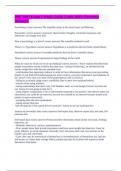Exam (elaborations)
PPE 3003 Exam 1 Study Guide || with 100% Errorless Answers.
- Course
- Institution
Psychology correct answers The scientific study of the mind, brain, and behavior Personality correct answers A person's characteristic thoughts, emotional responses, and behaviors; can change over time How is psychology a science? correct answers The scientific method is used Theory vs. Hy...
[Show more]



